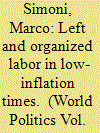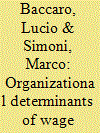| Srl | Item |
| 1 |
ID:
119693


|
|
|
|
|
| Publication |
2013.
|
| Summary/Abstract |
This article presents fresh empirical data showing that policy alignment between center-left governments and trade unions was a sustained feature of European politics between 1974 and 2005. This contradicts expectations of a wide delinkage between the electoral left and labor as a consequence of globalization, deindustrialization, and unionization decline. However, structural economic change has altered the policy field so that sustained policy alignment can no longer be explained by existing theoretical frameworks.
Based on a theoretical argument and a multivariate empirical test, the article contends that policy alignment is likelier to occur if labor plays an important role in economic management at the microlevel and the industry level and if unions are politically cohesive agents thanks to powerful confederation leadership supported by democratic decision-making practices. In making its case, the article bridges the literatures on comparative capitalism and party politics, in order to account for change and continuity in policy-making processes
|
|
|
|
|
|
|
|
|
|
|
|
|
|
|
|
| 2 |
ID:
100618


|
|
|
|
|
| Publication |
2010.
|
| Summary/Abstract |
This article contributes to the political economic literature regarding the effects of industrial relations institutions on national economic outcomes. Based on an econometric analysis of the determinants of wage moderation in sixteen industrialized countries between 1974 and 2000, it argues that the organizational characteristics of trade unions have a significant impact on wage dynamics. Controlling for a number of institutional and economic factors, the countries in which trade union confederations directly involve workers in the process of collective bargaining ratification have on average lower wage growth relative to productivity than others. The authors also find that collective bargaining coordination and contract ratification magnify each other's wage-dampening effect. Through case studies of Ireland and Italy, the article examines the causal mechanisms underlying the uncovered statistical regularities and concludes that, particularly at a time in which classic political exchange is waning, worker involvement in contract ratification allows confederation leaders to resolve conflicting claims inside their organizations at lower wage levels than are achieved by a less participatory governance process.
|
|
|
|
|
|
|
|
|
|
|
|
|
|
|
|